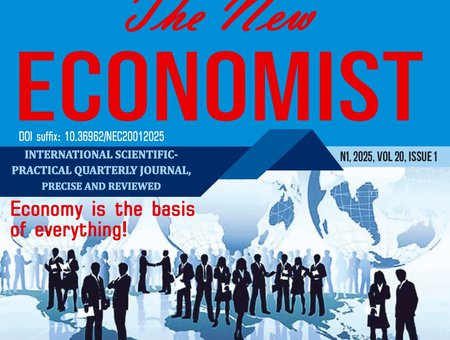Perspectives on the educational system in a global context

Nodar Sulashvili
MD, PhD, Doctor of Pharmaceutical and Pharmacological Sciences, Invited Lecturer of Tbilisi State Medical University

Marika Sulashvili
MD, Doctor of Family Medicine, Invited Lecturer of Tbilisi State Medical University

Ekaterine Lomia
PhD, Doctor in Political Science, Head of the “Black Sea Research Center” of IKSAD (Ankara, Turkey)
Abstract
Relevance of the topic: The evolving landscape of higher education necessitates a comprehensive exploration of global perspectives in teaching excellence frameworks and contemporary pedagogical paradigms. This study examines the ways in which these frameworks manifest across diverse educational contexts, shaping instructional strategies, fostering innovation, and enhancing learning outcomes. By analyzing cross-cultural influences and emerging trends in pedagogy, the research highlights the transformative role of modern teaching methodologies in advancing academic excellence worldwide. Furthermore, the study investigates the global impact of these strategies on institutional development, knowledge dissemination, and student engagement. Emphasizing the intersection of policy, practice, and innovation, this paper contributes to a deeper understanding of the dynamic interplay between teaching excellence and the globalization of higher education. The findings offer valuable insights for educators, policymakers, and academic institutions seeking to enhance teaching quality and promote sustainable educational advancements on a global scale. Additionally, the study explores the challenges and opportunities presented by global educational trends, including the integration of digital learning platforms, competency-based education, and interdisciplinary collaboration. The study contributes to the ongoing discourse on international best practices in teaching and learning, providing valuable insights for educators, policymakers, and institutions seeking to enhance the quality, accessibility, and sustainability of higher education in a globalized era. The manifestation of global perspectives in teaching excellence frameworks and contemporary pedagogical paradigms plays a crucial role in shaping the future of higher education worldwide. As institutions continue to embrace innovative teaching strategies, the integration of cross-cultural insights and evidence-based methodologies enhances both instructional quality and student engagement. This study underscores the transformative impact of modern pedagogical approaches in fostering academic excellence, institutional development, and global knowledge dissemination. By aligning educational practices with evolving global demands, higher education institutions can ensure long-term sustainability and relevance in an increasingly interconnected world. Moving forward, continued research and collaboration among educators, policymakers, and institutions will be essential in refining teaching frameworks, addressing emerging challenges, and maximizing the benefits of globalized education.
The manifestation of global perspectives in teaching excellence frameworks and contemporary pedagogical paradigms plays a crucial role in shaping the future of higher education worldwide. As institutions continue to embrace innovative teaching strategies, the integration of cross-cultural insights and evidence-based methodologies enhances both instructional quality and student engagement. This study underscores the transformative impact of modern pedagogical approaches in fostering academic excellence, institutional development, and global knowledge dissemination. By aligning educational practices with evolving global demands, higher education institutions can ensure long-term sustainability and relevance in an increasingly interconnected world. Moving forward, continued research and collaboration among educators, policymakers, and institutions will be essential in refining teaching frameworks, addressing emerging challenges, and maximizing the benefits of globalized education.
Acknowledgment-Declarations: The author has declared that there are no conflicts of interest.
References
- Kenny, N. P., et al. (2024). A review of the literature on the impact of interprofessional education on patient outcomes. Journal of Interprofessional Care, 28(3), 262-268.
- Karchava, L., Veshapidze, S., & Chiabrishvili, K. (2023). Economic perspective of establishing strategic partnership between China and Georgia. The New Economist, 18(3), 7-2.
- Gvelesiani, M., Veshapidze, S. (2016). European Values: What Can WeImplement from Them and How Can We Implement Them in Georgia. “Globalization & Business”. (1). 40-46. (In Georgian). Gvelesiani, M., Veshapidze, S. (2016). Values: Limits and Contradictions. Globalization & Business, (1). 35-39. (In Georgian).
- Nieder G. L. and Nagy F.(2022) Analysis of medical students’ use of web-based resources for a gross anatomy and embryology course. ClinAnat. 15(6), pp.409–418.
- Redshaw C. H. and Frampton I.(2024) Optimising inter-disciplinary problem-based learning in postgraduate environmental and science education: Recommendations from a case study. International Journal of Environmental & Science Education. 9, pp.97–110.
- Rennie F. and Morrison T.(2023) E-learning and social networking handbook. Routledge (NY): Resources for Higher Education.
- Sichinava, A., Chikava, M., Veshapidze, S., Sekhniashvili, D., & Pailodze, N. (2013). Realities of internationalization of higher education in Georgia. In PRADEC Conference Proceedings (Vol. 2, No. 1, pp. 95-98)
- Sánchez-Mendiola M., Kieffer-Escobar L. F., Marín-Beltrán S., Downing S. M., et al. (2022) Teaching of evidence-based medicine to medical students in Mexico: a randomized controlled trial. BMC Medical Education. 12(107), pp.1–14.
- Schmidt, H. G., & Moust, J. H. C. (2012). What makes a tutor effective? A structural equation modeling approach to learning and teaching in problem-based learning. Academic Medicine, 75(9), 876-883.
- Singhal A.(2017) Case-based Learning in Microbiology: Observations from a North West Indian Medical College. International Journal of Applied and Basic Medical Research. 7(Suppl 1),S47–S51.
- Sudarso S. Rahayu G. R. and Suhoyo Y.(2026) How does feedback in mini-CEX affect students’ learning response? International Journal of Medical Education. 7, pp.407–413.
- Taveira-Gomes T., Ferreira P., Taveira-Gomes I., Severo M., et al. (2016) What Are We Looking for in Computer-Based Learning Interventions in Medical Education? A Systematic Review. Journal of Medical Internet Research. 18(8), pp.1–21.
- Topping, Keith J. "The Effectiveness of Peer Tutoring in Further and Higher Education: A Typology and Review of the Literature." Higher Education 32, no. 3 (2023): 321-345.
- Harden, Ronald M. "AMEE Guide No. 21: Curriculum Mapping: A Tool for Transparent and Authentic Teaching and Learning." Medical Teacher 23, no. 2 (2011): 123-137.
- Kaufman, David M. "Applying Educational Theory in Practice." BMJ 326, no. 7382 (2003): 213-216.
- Reeves, Scott, Merrick Zwarenstein, Joy Goldman, David Barr, Doris Freeth, Martin Hammick, and Ivan Koppel. "The Effectiveness of Interprofessional Education: Key Findings from a New Systematic Review." Journal of Interprofessional Care 24, no. 3 (2020): 230-241.
- Lomia, E., 2017. The issues of cultural diversity in communication. THE CAUCASUS, 8.
- Lomia, E., 2020. Historical Perspectives of War, Conflict, and Intervention and their Transformation in the Twenty-First Century. International Journal of Social, Political and Economic Research, 7(4), pp.927-938.
- Lomia, E., 2020. The Evaluation of Russia's foreign policy towards Georgia following the ‘Rose Revolution’. Journal of Liberty and International affairs, 6(1), pp.112-128.
20. Lomia, T. and Lomia, E., 2020. Economic and Political Support of the European Union to Georgia: Retrospective Analysis of the EU-Georgia Relations. Vallis Aurea, 6(1), pp.35-43.
21. Sulashvili, N., Beglaryan M. Pharmacist’s professional features and work gratification. Black sea scientific journal of academic research multidiscipline journal. (Medicine, Pharmacy sciences) Volume 29. March-April 2016. Tbilisi, Georgia, pp. 62-68.
22. Sulashvili, N., Beglaryan M. Pharmacists’ professional features, viewed by the customer's (customer’s) eyes in Georgia. // Experimental and Clinical Medicine, Scientific-Practical Journal, №4, 2017. Tbilisi, Georgia, pp. 22-25.
23. Sulashvili, N. Peculiarities of professional for pharmacists, viewed by the health-care specialists in Georgia// Experimental and Clinical Medicine, Scientific-Practical Journal. №4 2017. Tbilisi, Georgia, pp.47-51.
24. Sulashvili, N., Beglaryan M. Characteristics of pharmacist activity, viewed by the customer’s// International Science and Innovation Festival 2017. Conf.-es “Healthy Lifestyle-Scientific Evidence and Controversial issues” and “Innovation in Medicine” Tbilisi State Medical University. September 2017. Tbilisi, Georgia. pp. 30-31.
25. N. Sulashvili, N. Alavidze, N. Abuladze, N. Kvizhinadze, M. Gogashvili, M. Beglaryan. Pharmaceutical professional and organizational issue aspects in Georgia. Materials of 12th Scientific and Practical Internet Conferences, The National University of Pharmacy, Scientific and Practical Internet-Conference: «Pharmacoeconomics in Ukraine, Condition and Development Prospects», (Kharkiv, Ukraine, May 22, 2020 Year). Pp 11-20.
26. N. Sulashvili; PECULIARITIES OF PROFESSIONAL AND CAREER IMPROVEMENT STRATEGY FOR PHARMACISTS REPUBLIC OF ARMENIA MINISTRY OF EDUCATION AND SCIENCE; YEREVAN STATE MEDICAL UNIVERSITY AFTER M. HERATSI; ABSTRACT of the dissertation for the scientific degree of Ph.D. in Pharmaceutical Sciences; On specialty 15.00.01 – Pharmacy; The Specialized Council 026 “Theoretical Medicine” of the Supreme Certifying Committee of the Republic of Armenia at the Yerevan State Medical University. YEREVAN – 2019; Pp 1-26.
27. Sulashvili N., Mchedluri T. The Features of the Role, Innovations, Occupational and Educational Per¬fection Vistas of Pharmacists’ Profession in the Scope of the Development of Pharmaceutical Care Di¬rection in Georgia // European Journal of Research (EJR), Volume 7, Issue 1, 2022. – PP. 14–25.
28. Johnson, Emily. "Global Approaches in Contemporary Pedagogy." International Journal of Education 45, no. 3 (2019): 123-140.
29. Brown, Michael. "Cultural Adaptation in Modern Teaching Methods." Journal of Educational Research 34, no. 2 (2017): 45-60.
30. Lee, Victor. "Effective Teaching Models for Diverse Learners." In Advancements in Pedagogy, edited by Maria G. Lopez, 150-165. Oxford: Oxford University Press, 2021.
31. Veshapidze, S. (2023). About the dangers of academic competition.
32. Veshapidze, S. (2023). Modern priorities of ensuring foreign economic security of Georgia.
33. Veshapidze, S. (2023). New developments in the global world: challenges and opportunities for Georgia. The New Economist, 18(3), 44-2
34. Veshapidze, S., & Karchava, L. (2022). Contradictions of Globalization under the COVID-19 Pandemic. Bull. Georg. Natl. Acad. Sci, 16(4), 152-157.
35. Veshapidze, S., & Kitashvili, S. (2025). The importance and benefits of the EU single market for Georgia. The New Economist, 19(3), 60-73.
36. Veshapidze, S., & Mgeladze, L. (2023). Some aspects of protection of labor freedom in higher education institution. The New Economist, 18(1), 40-2.
37. Veshapidze, S., & Zoidze, G. (2022). Value Choices of the Community in the Context of the COVID-19 Pandemic. DOI: https://doi. org/10.5281/zenodo, 6373197.
38. Veshapidze, S., Zoidze, G., & Berishvili, K. (2021). The economic determinant of the education system. Sciences of Europe, (81-2), 6-12.
39. Veshapidze, S., & Zoidze, G. (2022). On State Intervention in the Economy through the Budget in Georgia. World economy and international economic relations.-International Scientific Collection, 5.
40.Veshapidze, S., & Zoidze, G. (2021). Institutional Evolution of Higher Education in Georgia/საქართველოს უმაღლესი განათლების ინსტიტუციური ევოლუცია. The New Economist, 16(2), 33-2.
41. Veshapidze, S., Zubiashvili, T., & Chiabrishvili, K. (2021). Globalization and new Opportunities for Georgia. Globalization and Business, 6(12), 32-36.
42. Zoidze, G., Veshapidze, S. (2022). The Modern Economy and Values. Cambridge Scholars Publishing. p. 125.
43. Zoidze, G., & Veshapidze, S. (2022). Transformation of economic policy priorities under COVID-44. Three Seas Economic Journal, 3(2), 35-43.
45. Zoidze, G., Abuselidze, G., & Veshapidze, S. (2023). Economic Vulnerability of Small Powers. Journal of Geography, Politics and Society, 13(3), 1-12.
46. Zoidze, G., & Veshapidze, S. (2022). Transformation of economic policy priorities under COVID-47. Three Seas Economic Journal, 3(2), 35-43.
The new Economist, No1, 2025, Vol. 20, Issue 1.

07/04/2025
Copyright (c) 2025 Nodar Sulashvili, Marika Sulashvili, Ekaterine Lomia

This work is licensed under a Creative Commons Attribution-NonCommercial-NoDerivatives 4.0 International License.
